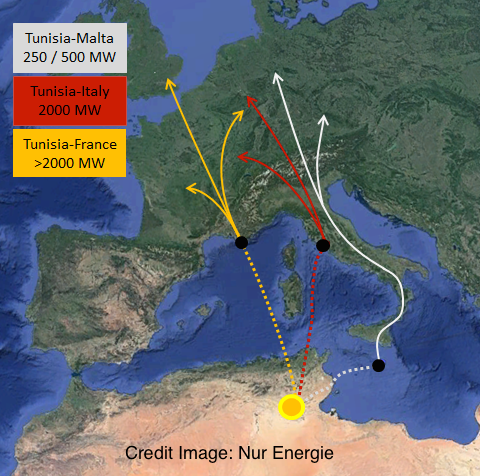Tunisian renewable energy project to export power to Europe

Exporting carbon free energy. The private company TuNur Limited, has filed its request for authorization with the Tunisian Ministry of Energy, Mines and Renewable Energy to build a 4.5GW solar export project in the Sahara Desert, near Rjim Maatoug, in the southwest of the country. The electricity generated is destined for Europe, with cables under the sea to Malta, Italy and France, supplying the growing European market for carbon-free electricity. It will be sufficient to power over 5 million European homes or fuel over 7 million electric vehicles. The initial 250MW plant, with a connection to Malta, could be running by 2020, for an estimated €1.6 billion investment.
An energy partnership with North Africa. According to Kevin Sara, CEO of TuNur “The economics of the project are compelling: the site in the Sahara receives twice as much solar energy compared to sites in central Europe thus, for the same investment, we can produce twice as much electricity” In 2014, Tunisia became the third country in the world to ink climate protection into its constitution, followed by a renewable energy law in 2015. TuNur lobbied hard to get provision for exports included in the clean energy legislation, against resistance from the state electricity monopoly. Although the project has faced some criticism, TuNur insists that its planned facility will help prevent desertification and minimise water consumption. An impact study also predicts that 2,000 direct jobs and 20,000 indirect jobs could be created.
The dream of infinite energy through clean desert power. According to the authors of a memorandum on ‘’Migration, sustainability and a Marshall Plan with Africa’’, presented last February to the Club of Rome, future energy surpluses could be exported to Europe. This has long been the vision of the Desertec Foundation (a non-profit foundation of scientists, politicians and economists) and the Desertec Industrial Initiative (DII – an international consortium of companies), which began in 2009 with the aim of promoting a € 400 billion project of Concentrated Solar Power stations in MENA countries, specifically Morocco, Tunisia, Algeria, Lybia, Egypt, Jordan and Saudi Arabia, that would have provided 15% of Europe’s power by 2050. Although in recent years the Desertec initiative has been stalling, with many partners suspending their membership, the recent development in Tunisia may yet inject new life in the idea of tapping into the massive renewable energy potential of the Sahara desert.
Resources: The Solar Power Plant Noor: A shining light in the desert | 8th Desert Energy Leadership Summit | The Law No. 12 of 11 May 2015 relating to electricity produced from renewable energy sources



